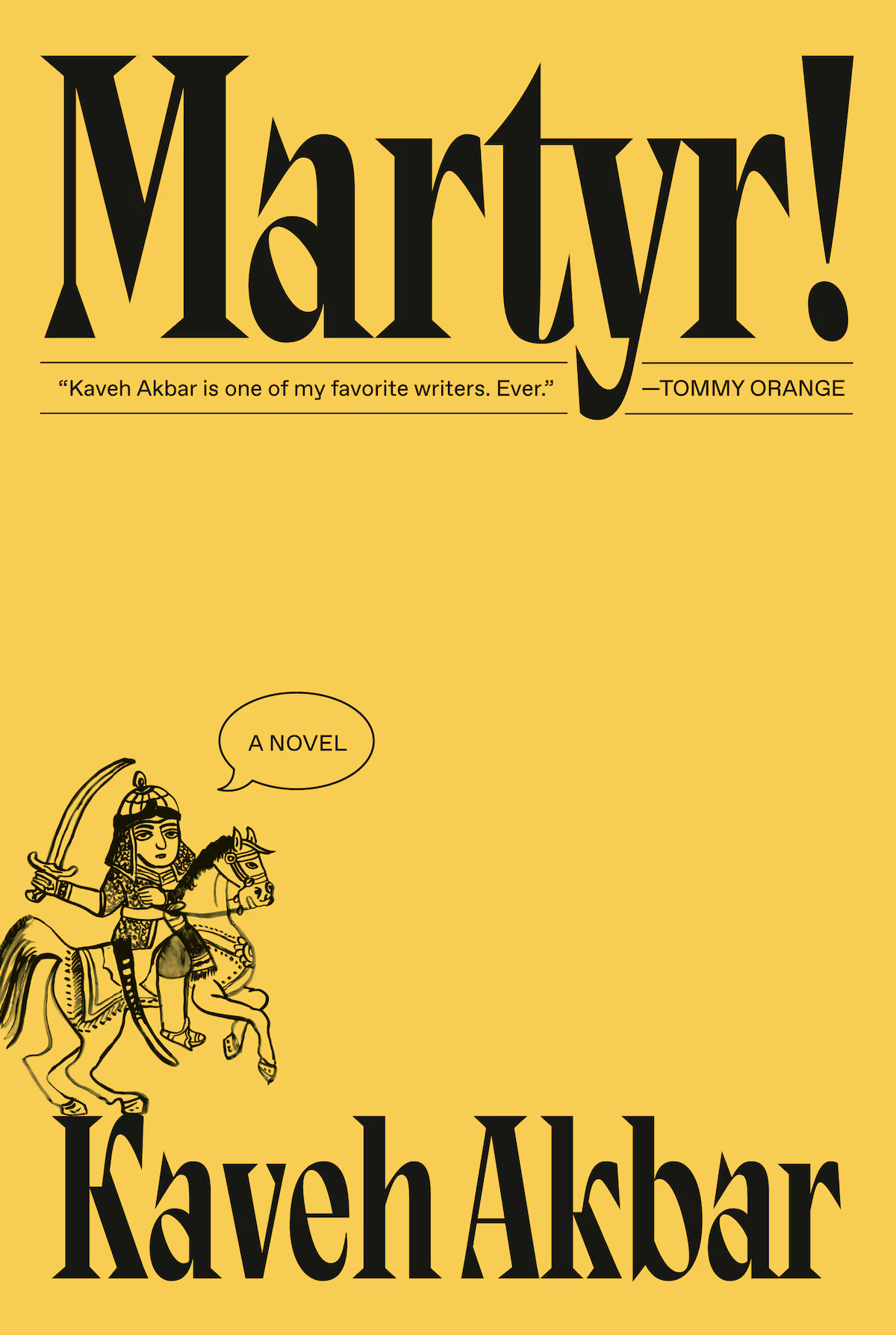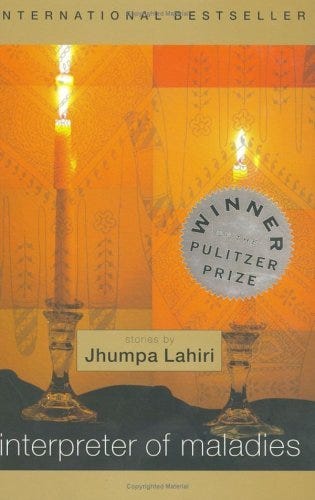Good morning!
I read two literary fiction books — Maryr! and Interpreter of Maladies. I also binged an urban fantasy book, Ninth House, and its sequel, Hell Bent. Let’s get into it.
What I read:
Martyr! by Kaveh Akbar
Martyr! is Kaveh Akbar’s debut novel, set in Tehran, New York City, and Indiana. The person shouting “Martyr!” is Cyrus Shams, a struggling poet and recovering alcoholic and addict in his late 20s. Akbar follows multiple points of view in Cyrus’s family (his mother, father, friend-lover, and uncle) from 1954 to the 2010s.
Cyrus was born in Persia, but his father moved him to the U.S. when he was a few months old after his mother, Roya, died. Roya was flying to Dubai when her plane was shot down over the Persian Gulf by a US Navy warship missile (which is inspired by Iran Air Flight 665, which was shot down by U.S.S. Vincennes in 1988). Cyrus laments her death as “actuarial,” a “rounding error.”
Cyrus’s father, Ali, worked at a poultry processing factory in Indiana until his death when Cyrus was in his 20s. As Cyrus tells his AA sponsor, “My dad died anonymous after spending decades cleaning chicken shit. I want my life—my death—to matter more than that.”
Cyrus is a tortured poet who works as an actor at a hospital so that doctors can practice their bedside manner. He becomes obsessed with martyrdom and starts to write a book in a file called BOOKOFMARTYRS.docx. on his computer. He imagines conversations between the living, dead, and fictional characters (like Lisa Simpson talking to his late mother). Cyrus also seeks out Orkideh, a terminally ill Iranian artist performing her last show, “Death-Speak,” at the Brooklyn Museum (her performance art resembles Marina Abramović).
This bright yellow cover has been everywhere, and I finally got it off my Libby holds this week. Akbar is a well-known poet, and his sensitivity to language shows here. Martyr! is filled with impressive, sweeping prose that easily jumps from philosophical debates to fever dreams to sharp dialogue. Cyrus is a fully-formed character, and the plot and dark comedy drew me in. Akbar also does a great job with cultural observations — Cyrus grapples with the “pathological politeness” at the “intersection of Iranian-ness and Midwestern-ness.”
However, I cannot say I loved the entire process of reading this book. I was somewhat relieved to finish it. I really admire the prose and language, but I did not love being in the head of Cyrus, who is constantly trying to stave off the “big pathological sad.” I was probably not in the right mood to read this dark comedy.
Overall, I would recommend this book to someone looking for a beautifully written work of literary fiction with some dark humor.
Rating: 4/5
Genre: Fiction
Notable prizes/book clubs/lists: Finalist for National Book Award for Fiction (2024)
Page count: 352 pages
Audio: 10 hours 39 min
Interpreter of Maladies by Jhumpa Lahiri
The Interpreter of Maladies is a Pulitzer Prize-winning collection of short stories by Jhumpa Lahiri. These stories are primarily based in Boston but also occur in India and London and center on immigrants adjusting to their new lives. These characters struggle with loneliness, marital discord, miscommunication, and cultural displacement.
My paperback copy of The Interpreter of Maladies has survived three moves unread. I am so glad that I finally read it last week. These stories are expertly crafted, with realistic dialogue and simple prose. They are part of a masterclass in showing, not telling. There are nine stories here, so I’ll briefly touch on two of the most famous stories.
The story that sticks with me the most is the first one, “A Temporary Matter,” which follows a couple, Shoba and Shukumar, who live near Boston. Shoba and Shukumar recently lost their infant son, and their grief has created a widening gulf between them. But then they receive a notice:
The notice informed them that it was a temporary matter: for five days their electricity would be cut off for one hour, beginning at eight P.M. A line had gone down in the last snowstorm, and the repairmen were going to take advantage of the milder evenings to set it right.
The two begin to reconnect over candlelit dinners and confess their secrets in the darkness.
The titular story, “Interpreter of Maladies,” depicts a tour guide, Mr. Kapasi, showing the American-born Das family around India. Kapasi observes the friction between the couple and their relationship with their two children. Kapasi has a second job at a doctor’s office as a Gujarati interpreter, translating their maladies. The wife is desperate for someone to confide in and views Kapasi as a psychological counselor. She confesses her secrets, and Kapasi begins to see how the Western-style marriage between the couple has the same marital discord as his own stilted arranged marriage:
He wondered if Mr. and Mrs. Das were a bad match, just as he and his wife were. Perhaps they, too, had little in common apart from three children and a decade of their lives. The signs he recognized from his own marriage were there--the bickering, the indifference, the protracted silence.
Lahiri examines the breakdown of relationships and the struggles in communication.
This collection of short stories is definitely worth reading! But if you don’t have time to read it, you can also check out “A Temporary Matter,” published in The New Yorker.
Rating: 4/5
Genre: Literary Fiction (Short Stories)
Notable prizes/book clubs/lists: Pulitzer Prize for Fiction (2000)
Page count: 198 pages
Audio: 6 hr 15 min
Movie/TV pairings: The Namesake
Ninth House and Hell Bent by Leigh Bardugo
Ninth House and Hell Bent are part of an ongoing urban fantasy series set on Yale’s campus. I read both this week, but to avoid spoilers, I will mostly discuss Ninth House and briefly touch on Hell Bent at the end.
Galaxy “Alex” Stern is plucked from obscurity in LA to attend Yale on a full ride. We meet her at age 20 — she’s a high school dropout, a former addict who fell into small-time drug dealing, and the sole survivor of a horrific multi-homicide. Her mysterious benefactors offer to provide a backstory that she’s an artist to explain the lapses in her academic record. Why do they want Alex? She can naturally see “Grays,” or ghosts. No one else can see them unless they take a special potion called Orozcerio.
At Yale, Alex joins Lethe, the Ninth House of the other eight “Houses of the Veil,” which include Yale’s secret societies, like Skull and Bones and Scroll and Key. In this novel, these societies revolve around different forms of ritual magic. Skull and Bones can predict the future of the stock market through animal/human sacrifice. Book and Snake specializes in necromancy and passes information through dead informants. However, these rituals attract Grays, so Lethe House steps in to clean up their mess and dispel these ghosts.
Daniel Arlington (“Darlington”), a senior at Yale in Lethe, serves as Alex’s mentor (he’s called a “Dante,” and she’s a “Virgil”). Alex navigates being a fish out of water at privileged Yale and struggles to adjust to the magical world of these societies. Bardugo follows Darlington and Alex and tells their story through three different timelines.
I resisted reading Ninth House for a long time because it sounded like a sort of Buffy the Vampire Slayer/Charmed/Yale fanfic. Which it sort of is. Hellmouths open. Our leads must vanquish demons, ward off spirits, and investigate murders. But after finishing it, I’m not sure why I ever thought that sounded like a bad combination.
I love the aforementioned shows, dark academia, and a story about a misfit thrown into an unknown magical world. So I enjoyed Ninth House. Alex is angsty but in a generally likable way. This book also rivals Harry Potter for characters talking about doing homework but never doing any.
But Ninth House is not perfect. Part of me wishes it were set on a fictional campus loosely based on Yale. I rolled my eyes when reading namedrops like Steven Schwarzman, a 1969 Bonesman — a fact I inexplicably spent time confirming on Wikipedia. While I usually like an anachronistic timeline, the constant flashbacks threw off the pacing for me. I often felt like I was just getting hooked on the story, only to turn the page to the next chapter and be thrown into a past or future storyline that I wasn’t as invested in. Plot-wise, I wish Bardugo was more heavy-handed with a love story, although other readers might disagree. I suspect we are starting the slowest of burns with this series. Most of my complaints persisted in Hell Bent, but I still enjoyed it and will continue with this series whenever Bardugo publishes her third installment.
Overall, I recommend Ninth House for a fun escape into the occult and a fully-formed urban fantasy world.
Rating: 3.8/5
Genre: Urban Fantasy
Page count: 461 pages
Audio: 16 hr 22 min
Movie/TV pairings: Harry Potter, The Magicians, Buffy the Vampire Slayer, Charmed
Articles and TV shows I cannot stop thinking about:
Charlie XCX Hosts Saturday Night Live
I am still re-watching clips from last week’s SNL episode with Charlie XCX.
“How AI is decoding the animal kingdom” in The Financial Times
I have been reading a lot of depressing articles about AI and its impact on the environment, jobs, material resources, etc., so I read this positive one on how AI is unlocking animal conversations!
What I cooked:
Chicken soup with lime and avocado
I made this Mexican-ish chicken soup with lime and avocado. I doubled the amount of garlic and added cumin/coriander. I also sauteed the onions, garlic, and pepper before adding the broth.










